九年级英语上册 Unit 3 Topic 2 Some things usually have different meanings in different C教案
仁爱版英语九年级上册Unit 3 Topic 2《Some things usually have

仁爱版英语九年级上册Unit 3 Topic 2《Some things usually have differentmeanings in》SectionB 教学设计一. 教材分析本课选自仁爱版英语九年级上册Unit 3 Topic 2《Some things usually have different meanings in different cultures》Section B。
本节课主要讨论了在不同文化中,一些事物可能具有不同的含义。
通过对比中西方文化中的一些事物,让学生了解并认识到文化差异,学会尊重和理解不同文化背景下的价值观和行为方式。
教材内容丰富,贴近学生生活实际,有利于激发学生的学习兴趣和积极性。
二. 学情分析九年级的学生已经具备了一定的英语基础,能够听懂并运用基本的日常用语进行交流。
但是,对于一些抽象的概念和深层次的文化差异,学生可能还较为陌生。
因此,在教学过程中,教师需要善于引导,让学生通过观察、思考、讨论等方式,逐步理解和掌握所学内容。
三. 教学目标1.知识目标:让学生掌握表示文化差异的词汇和表达方式,如traditional, festival, custom等;能听懂、说出一件事情在不同文化中的不同含义。
2.能力目标:培养学生运用英语进行交流和讨论的能力,提高学生的跨文化交际意识。
3.情感目标:使学生认识到文化差异的存在,学会尊重和理解不同文化背景下的价值观和行为方式。
四. 教学重难点1.重点:让学生能够运用所学的词汇和表达方式,谈论文化差异。
2.难点:让学生理解并能够表达一件事情在不同文化中的不同含义。
五. 教学方法1.任务型教学法:通过设定各种真实的任务,让学生在完成任务的过程中,自然地学习和运用所学知识。
2.情境教学法:创设各种文化背景下的情境,让学生在具体的情境中,感受和理解文化差异。
3.交际教学法:鼓励学生积极参与课堂交流,提高学生的跨文化交际能力。
六. 教学准备1.准备相关文化背景的图片、视频等教学素材。
九年级英语上册Unit3Topic2SomethingsusuallyhavedifferentmeaningsindifferentculturesSectionA仁爱版
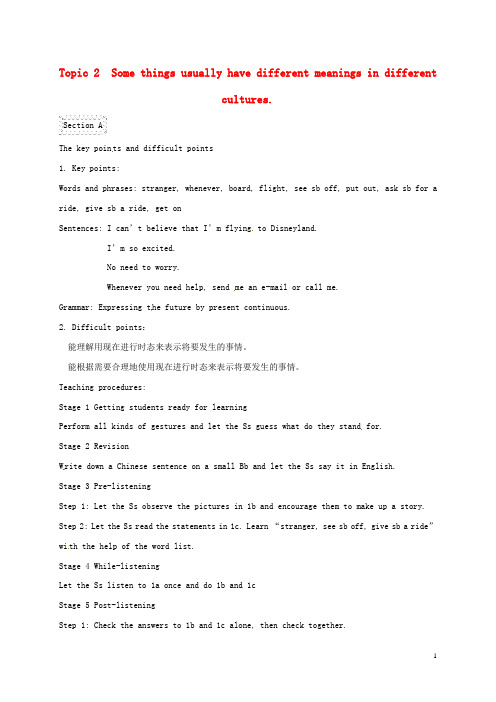
Topic 2 Some things usually have different meanings in differentcultures.Section AThe key poin ts and difficult points1. Key points:Words and phrases: stranger, whenever, board, flight, see sb off, put out, ask sb for a ride, give sb a ride, get onSentences: I can’t believe that I’m flying to Disneyland.I’m so excited.No need to worry.Whenever you need help, send me an e-mail or call me.Grammar: Expressing t he future by present continuous.2. Difficult points:能理解用现在进行时态来表示将要发生的事情。
能根据需要合理地使用现在进行时态来表示将要发生的事情。
Teaching procedures:Stage 1 Getting students ready for learningPerform all kinds of gestures and let the Ss guess what do they stand for.Stage 2 RevisionW rite down a Chinese sentence on a small Bb and let the Ss say it in English.Stage 3 Pre-listeningStep 1: Let the Ss observe the pictures in 1b and encourage them to make up a story. Step 2: Let the Ss read the statements in 1c. Learn “stranger,see sb off, give sb a ride”wi th the help of the word list.Stage 4 While-listeningLet the Ss listen to 1a once and do 1b and 1cStage 5 Post-listeningStep 1: Check the answers to 1b and 1c alone, then check together.Step 2: Let the Ss read 1a for the second time and circle the new words and sentences which express the future by using present continuo us.Step 3: Let the Ss read 1a for the third time, discuss in groups and find the key points. Let each group choose a member to speak them out.Stage6 Finishing Task 3Step 1: Present 2 Columns of sentences. Co lumn A in present co ntinuous, expressing the co ntinuous; Column B in present continuous, too, but expressing the future. Let the Ss study the sentences and find out something different.Step 2: Let the Ss do 3 alone, then check the answers together.Stage 7 Finishing Task 4Let the Ss make up conversations in pairs. Encourage some pairs to act out.Stage 8 Finishing Task 2Let the Ss read the questions in 2 quickly, then listen to the tape and choose the correct answers.Stage 9 Summarizing and Assigning homeworkStep 1: Let the Ss sum up what they have learned in this period.Step 2: HMKSearch more information about body languages in the world.。
仁爱版英语九年级上册Unit 3 Topic 2. 《Some things usually hav
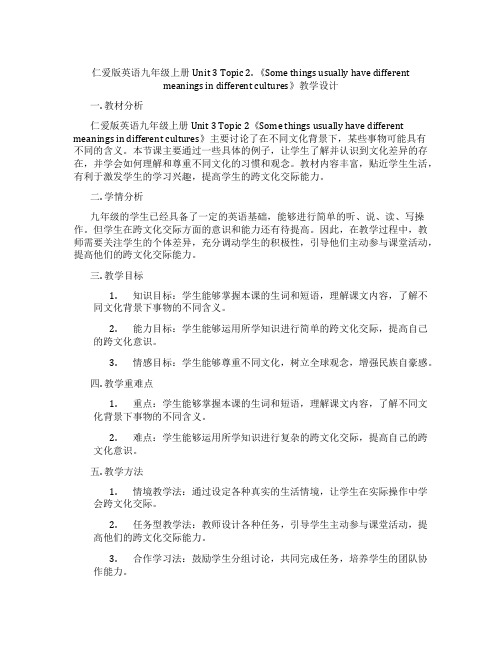
仁爱版英语九年级上册Unit 3 Topic 2. 《Some things usually have differentmeanings in different cultures》教学设计一. 教材分析仁爱版英语九年级上册Unit 3 Topic 2《Some things usually have different meanings in different cultures》主要讨论了在不同文化背景下,某些事物可能具有不同的含义。
本节课主要通过一些具体的例子,让学生了解并认识到文化差异的存在,并学会如何理解和尊重不同文化的习惯和观念。
教材内容丰富,贴近学生生活,有利于激发学生的学习兴趣,提高学生的跨文化交际能力。
二. 学情分析九年级的学生已经具备了一定的英语基础,能够进行简单的听、说、读、写操作。
但学生在跨文化交际方面的意识和能力还有待提高。
因此,在教学过程中,教师需要关注学生的个体差异,充分调动学生的积极性,引导他们主动参与课堂活动,提高他们的跨文化交际能力。
三. 教学目标1.知识目标:学生能够掌握本课的生词和短语,理解课文内容,了解不同文化背景下事物的不同含义。
2.能力目标:学生能够运用所学知识进行简单的跨文化交际,提高自己的跨文化意识。
3.情感目标:学生能够尊重不同文化,树立全球观念,增强民族自豪感。
四. 教学重难点1.重点:学生能够掌握本课的生词和短语,理解课文内容,了解不同文化背景下事物的不同含义。
2.难点:学生能够运用所学知识进行复杂的跨文化交际,提高自己的跨文化意识。
五. 教学方法1.情境教学法:通过设定各种真实的生活情境,让学生在实际操作中学会跨文化交际。
2.任务型教学法:教师设计各种任务,引导学生主动参与课堂活动,提高他们的跨文化交际能力。
3.合作学习法:鼓励学生分组讨论,共同完成任务,培养学生的团队协作能力。
六. 教学准备1.教学课件:制作课件,展示课文内容、生词和短语。
仁爱版英语九年级上册Unit3Topic2SomethingsusuallyhavedifferentmeaningsinSectionA

Unit3 Topic2 SectionA 教学设计Ⅰ. Material analysis本课是九年级第三单元第二话题的第一课时。
主活动是1a和3。
通过孩子们在去机场的路上之所见及所谈引出本话题的主要内容Body Language和语法知识:用现在进行时表示将要发生的事情。
1a部分通过对话呈现肢体语言和语法知识。
1b和1c对1a的内容进行巩固。
2通过听短文让学生更多地感知新语法。
3和4则是对新语法知识进行归纳、巩固。
通过本课,既可以让学生初步掌握新语法知识,体验肢体语言的作用,还可以培养学生乐于助人的情操。
Ⅱ. Teaching aims1.Knowledge aims:掌握本课的重点词汇和短语,初步学习“用现在进行时表示将要发生的事情”。
2.Skill aims:能通过观察,尝试总结如何运用现在进行时表示将要发生的事情。
能运用新语法知识来进行听、说活动。
3.Emotional aims: (optional)培养学生乐于助人的良好品质。
4.Culture awareness: (optional)让学生知道肢体语言是沟通交流的重要手段之一。
Ⅲ. The key points and difficult points1. Key points:Words and phrases: stranger, whenever, board, flight, see sb off, put out, ask sb for a ride, give sb a ride, get onSentences: I can’t believe that I’m flying to Disneyland.I’m so excited.No need to worry.Whenever you need help, send me an e-mail or call me.Grammar: Expressing the future by present continuous.2.Difficult points:能理解用现在进行时态来表示将要发生的事情。
仁爱版九年级英语上册Unit 3 Topic 2. 《Some things usually hav
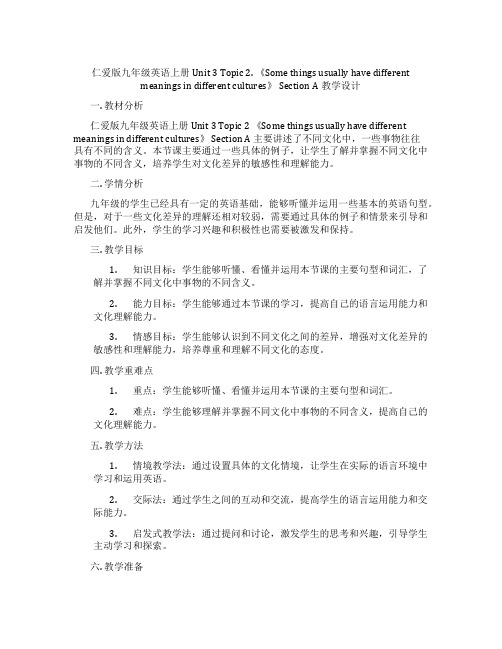
仁爱版九年级英语上册Unit 3 Topic 2. 《Some things usually have differentmeanings in different cultures》 Section A教学设计一. 教材分析仁爱版九年级英语上册Unit 3 Topic 2 《Some things usually have different meanings in different cultures》 Section A 主要讲述了不同文化中,一些事物往往具有不同的含义。
本节课主要通过一些具体的例子,让学生了解并掌握不同文化中事物的不同含义,培养学生对文化差异的敏感性和理解能力。
二. 学情分析九年级的学生已经具有一定的英语基础,能够听懂并运用一些基本的英语句型。
但是,对于一些文化差异的理解还相对较弱,需要通过具体的例子和情景来引导和启发他们。
此外,学生的学习兴趣和积极性也需要被激发和保持。
三. 教学目标1.知识目标:学生能够听懂、看懂并运用本节课的主要句型和词汇,了解并掌握不同文化中事物的不同含义。
2.能力目标:学生能够通过本节课的学习,提高自己的语言运用能力和文化理解能力。
3.情感目标:学生能够认识到不同文化之间的差异,增强对文化差异的敏感性和理解能力,培养尊重和理解不同文化的态度。
四. 教学重难点1.重点:学生能够听懂、看懂并运用本节课的主要句型和词汇。
2.难点:学生能够理解并掌握不同文化中事物的不同含义,提高自己的文化理解能力。
五. 教学方法1.情境教学法:通过设置具体的文化情境,让学生在实际的语言环境中学习和运用英语。
2.交际法:通过学生之间的互动和交流,提高学生的语言运用能力和交际能力。
3.启发式教学法:通过提问和讨论,激发学生的思考和兴趣,引导学生主动学习和探索。
六. 教学准备1.教师准备:教师需要提前准备本节课的教学材料,包括PPT、课文录音、文化差异的例子等。
2.学生准备:学生需要提前预习本节课的内容,了解和学习本节课的主要句型和词汇。
九年级英语上册Unit3Topic2SomethingsusuallyhavedifferentmeaningsindifferentculturesSectionD仁爱版
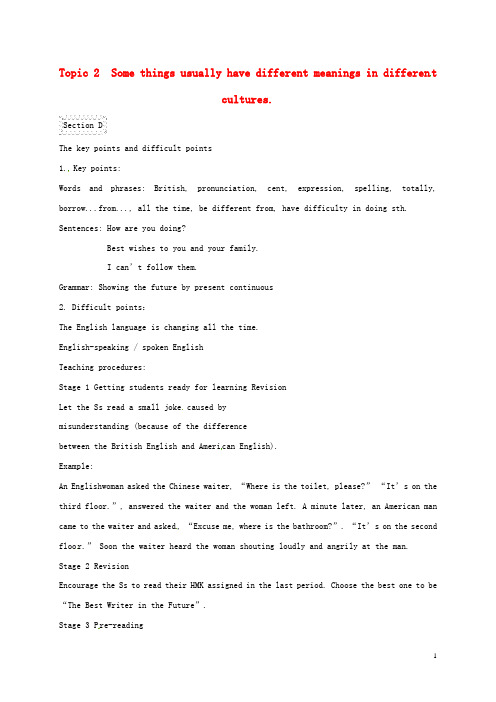
Topic 2 Some things usually have different meanings in differentcultures.Section DThe key points and difficult points1. Key points:Words and phrases: British, pronunciation, cent, expression, spelling, totally, borrow...from..., all the time, be different from, have difficulty in doing sth. Sentences: How are you doing?Best wishes to you and your family.I can’t follow them.Grammar: Showing the future by present continuous2. Difficult points:The English language is changing all the time.English-speaking / spoken EnglishTeaching procedures:Stage 1 Getting students ready for learning RevisionLet the Ss read a small joke caused bymisunderstanding (because of the differencebetween the British English and Ameri can English).Example:An Englishwoman asked the Chinese waiter, “Where is the toilet, please?”“It’s on the third floor.”, answered the waiter and the woman left. A minute later, an American man came to the waiter and asked, “Excuse me, where is the bathroom?”. “It’s on the second floo r.” Soon the waiter heard the woman shouting loudly and angrily at the man.Stage 2 RevisionEncourage the Ss to read their HMK assigned in the last period. Choose the best one to be “The Best Writer in the Future”.Stage 3 P re-readingLet the Ss discuss whether there are differences between British English and American English. Encourage the Ss to guess what kinds of differences may exist between the two languages.Stage 4 While-readingStep1: Let the Ss read 1a quickly, find out the differences between the two l anguages, and put the four sentences in the right places.Step2: Read 1a again and finish 1b.Stage 5 Post-readingStep 2: Teach the words “elevator, cent, and cookbook”by showing pictu res or real objects and deal with the difficult points.Stage 6 Finishing projectLet th e Ss read Wang Junfeng’s letter, make clear what kind of help he needs, discuss in groups and report the suggestions to the class.Stag e 7 Summarizing and Assigning homeworkStep 1: Let the Ss go over the whole topic, discuss and sum up the key points of this topic. Step 2: HMK:Let the Ss sum up the key points and write them down on the exercise book.Let the Ss search more examples about differences between American English and British English in expression, spelling, pr onunciation, etc.。
重庆市涪陵第十九中学校九年级英语上册《Unit 3 Topic 2 Some things usua

Unit 3 Topic 2 Some things usually have different meanings indifferent culturesSection B课型:听说课学时:1学时一、学习目标:1.学习不同国家肢体语言的含义,了解一些做出请求的礼貌用语,询问状况的表达法2.(学生填写)________________________________________________________二、学习重点:1. 学习并巩固be going to /be doing 用法。
2. (学生填写)三、学习难点:1.Be going to /be going 的用法2.(学生填写)________________________________________________________ 一.自习(一)看第132页(65-66)的新单词,拼读,熟记并默写。
1.点头 2.沉默3.臀部 4. 表扬5.研究 ____ 6. 秘密7. 困惑的 8. 胜利9. 误解 10.典型的_______________(二)重点短语。
1.做调查 2.向某人问好3.是…还是 4.即使5. 取得胜利6. 一种表尊敬的方式(三)重点句子。
1.在日本,当我们问好的时候鞠躬,这是一种表示尊敬的方式。
2.我想知道是否在所有的文化里肢体语言都意味着相同的意思。
3.让我们去问问王老师和琼斯老师能否帮我们做调查。
二.自疑对照学习目标和重难点,你有什么疑惑?家长签字_________________预习等级__________________组长签字________________自探活动一:1.听磁带,完成1b,朗读课文1a.2.剖析课文,结合自身知识疑惑,小组讨论并展示,师生共同解惑。
3.读1a,完成1c.活动二:运用不定代词和副词,完成2,活动三:朗读,注意弱读,连读和语调,完成3.四.自测一、单项选择.()1.You should _______ your son .He works much harder than beore.A.refuse B.force C.praise D.punish( ) 2.I w onder _______ he stays at home_______ goes to the zoo.A.both, and B.whether, or C.if, or D.not only, but also( ) 3.I notice the boy ______ in the room .A.cry B.to c ry C.cries D.crying二.根据汉语意思完成句子。
广东省台山市新宁中学九年级英语上册 Unit 3 Topic 2 Some things usual
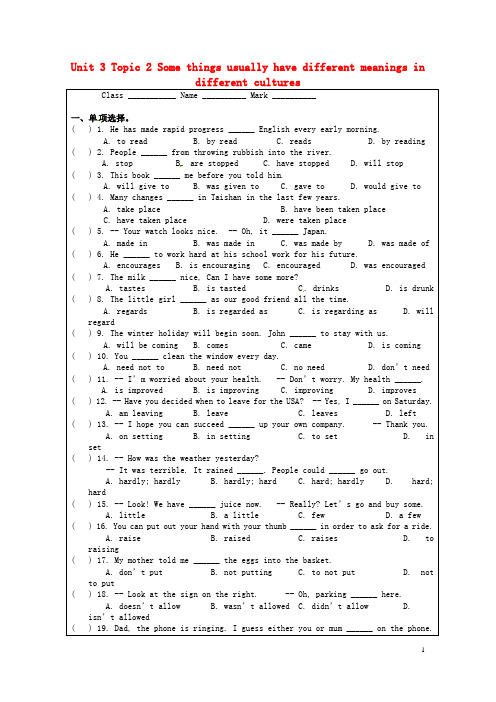
Unit 3 Topic 2 Some things usually have different meanings in Class ___________ Name __________ Mark __________一、单项选择。
( ) 1. He has made rapid progress ______ English every early morning.A. to readB. by readC. readsD. by reading ( ) 2. People ______ from throwing rubbish into the river.A. stopB. are stoppedC. have stoppedD. will stop( ) 3. This book ______ me before you told him.A. will give toB. was given toC. gave toD. would give to ( ) 4. Many changes ______ in Taishan in the last few years.A. take placeB. have been taken placeC. have taken placeD. were taken place( ) 5. -- Your watch looks nice. -- Oh, it ______ Japan.A. made inB. was made inC. was made byD. was made of ( ) 6. He ______ to work hard at his school work for his future.A. encouragesB. is encouragingC. encouragedD. was encouraged ( ) 7. The milk ______ nice, Can I have some more?A. tastesB. is tastedC. drinksD. is drunk ( ) 8. The little girl ______ as our good friend all the time.A. regardsB. is regarded asC. is regarding asD. willregard( ) 9. The winter holiday will begin soon. John ______ to stay with us.A. will be comingB. comesC. cameD. is coming ( ) 10. You ______ clean the window every day.A. need not toB. need notC. no needD. don’t need ( ) 11. -- I’m worried about your health. -- Don’t worry. My health ______.A. is improvedB. is improvingC. improvingD. improves ( ) 12. -- Have you decided when to leave for the USA? -- Yes, I ______ on Saturday.A. am leavingB. leaveC. leavesD. left ( ) 13. -- I hope you can succeed ______ up your own company. -- Thank you.A. on settingB. in settingC. to setD. inset( ) 14. -- How was the weather yesterday?-- It was terrible. It rained ______. People could ______ go out.A. hardly; hardlyB. hardly; hardC. hard; hardlyD. hard;hard( ) 15. -- Look! We have ______ juice now. -- Really? Let’s go and buy some.A. littleB. a littleC. fewD. a few ( ) 16. You can put out your hand with your thumb ______ in order to ask for a ride.A. raiseB. raisedC. raisesD. toraising( ) 17. My mother told me ______ the eggs into the basket.A. don’t putB. not puttingC. to not putD. notto put( ) 18. -- Look at the sign on the right. -- Oh, parking ______ here.A. doesn’t allowB. wasn’t allowedC. didn’t allowD.isn’t allowed( ) 19. Dad, the phone is ringing. I guess either you or mum ______ on the phone.A. is wantedB. are wantedC. wantsD. want ( ) 20. Few students can understand the sentences until it ______ twice or three times.A. has explainedB. will be explainedC. will explainD. isexplained( ) 21. The boy hopes ______ a basketball.A. to getB. gettingC. getsD. for get( ) 22. Mr. Lee ______ Beijing at five tomorrow afternoon.A. is arrivingB. will reach inC. is gettingD. is reaching( ) 23. In Japan, people bow as ______ respect.A. plenty ofB. a kind ofC. a sign ofD. a lot of ( ) 24. We ______ that we ______ an English test next Monday.A. are told; haveB. tell; will haveC. are told; will haveD. told; were going to have ( ) 25. -- I feel very happy that I ______ to be the host. -- Congratulations!A. chooseB. am chosenC. haven’t chosenD. chosen ( ) 26. We ______ to the U.S.A. tomorrow.A. will be travelingB. are travelingC. travelingD. travel( ) 27. -- Why are you in such a hurry?-- My uncle is flying to America. I’m going to ______ at the airport.A. send for himB. pick him upC. see him offD. meet him ( ) 28. To develop his new company, he has to ______ some research with his friends.A. doB. makeC. findD. get( ) 29. The keys ______ in her pocket.A. are keptB. is keptC. was keptD. Kept( ) 30. As we know, Australia is ______ country as well.A. an English-speakingB. an English-spokenC. a speaking-EnglishD. the English-spoken( ) 31. My little sister likes ______ when she is angry.A. stamping her footB. cross her armsC. put out her handD. keeping silence二、用括号词的正确形式填空。
- 1、下载文档前请自行甄别文档内容的完整性,平台不提供额外的编辑、内容补充、找答案等附加服务。
- 2、"仅部分预览"的文档,不可在线预览部分如存在完整性等问题,可反馈申请退款(可完整预览的文档不适用该条件!)。
- 3、如文档侵犯您的权益,请联系客服反馈,我们会尽快为您处理(人工客服工作时间:9:00-18:30)。
Some things usually have different meanings in different
cultures
Section C
Ⅰ. Material analysis
本课是九年级第三单元第二话题的第三课时。
主活动是1a。
通过学习1a,了解在中西方文化中相同的动植物被赋予的不同含义。
1b和1c是为检测学生是否理解1a而设计,2是针对语言知识而言的,3虽然是写作任务,但可以看做是继续探讨文化差异,只是让学生自己去完成介绍文化差异的任务。
了解文化差异,对于英语学习非常重要,只有知道有差异,才能更好地理解英语国家的文化。
通过本课的学习,让学生知道要学好英语,不只是会说、会听、会读、会写就够了,还要理解文字所承载的文化。
3的写作任务需要较多时间才能充分完成,故留作课后作业让学生独立完成,在第四课时可以让学生展示,但可以先处理3的词汇。
Ⅱ. Teaching aims
1. Knowledge aims:
掌握本课的重点词汇和短语,了解东西方文化的差异。
2. Ski ll aims:
能正确理解含有动植物的英语习语。
能恰当运用含有动植物的英语习语来表达地道的英语,避免中式英语。
3. Emotional aims: (optional)
让学生关爱身边的动植物,因为它们使得语言变得丰富多彩,从而使学生更加想学好这门语言。
4.Culture awareness: (optional)
知道一些常见的动植物在英语文化中的特殊含义。
Ⅲ. The key points and difficult points
1. Key points:
Words and phrases: differently, consider, honest, ancient, compare, courage, mistake, pride, wisdom, be regarded as, compare ...to..., make
mistakes, mistake ...for..., take pride in consider doing sth. S entences: In ancient times, dragons are regarded as...
The ancient emperors compared themselves to dragons.
Everybody makes mistakes at times.
2. Difficult points:
能理解在不同的国家,同一动植物的含义是有差异的。
在与英语本土人士交谈时,要注意这些差异,以免引起误会。
Ⅳ. Learning strategies
在遇到含有动植物的英语句子时,不能按照字面意思去理解。
在平常的学习中要多收集、整理与动植物相关的习语。
Ⅴ. Teaching aids
各种动植物的图片/录音机/小黑板/PPT/英语词典等。
Ⅵ. Teaching procedures
Ⅶ. Blackboard design
2。
